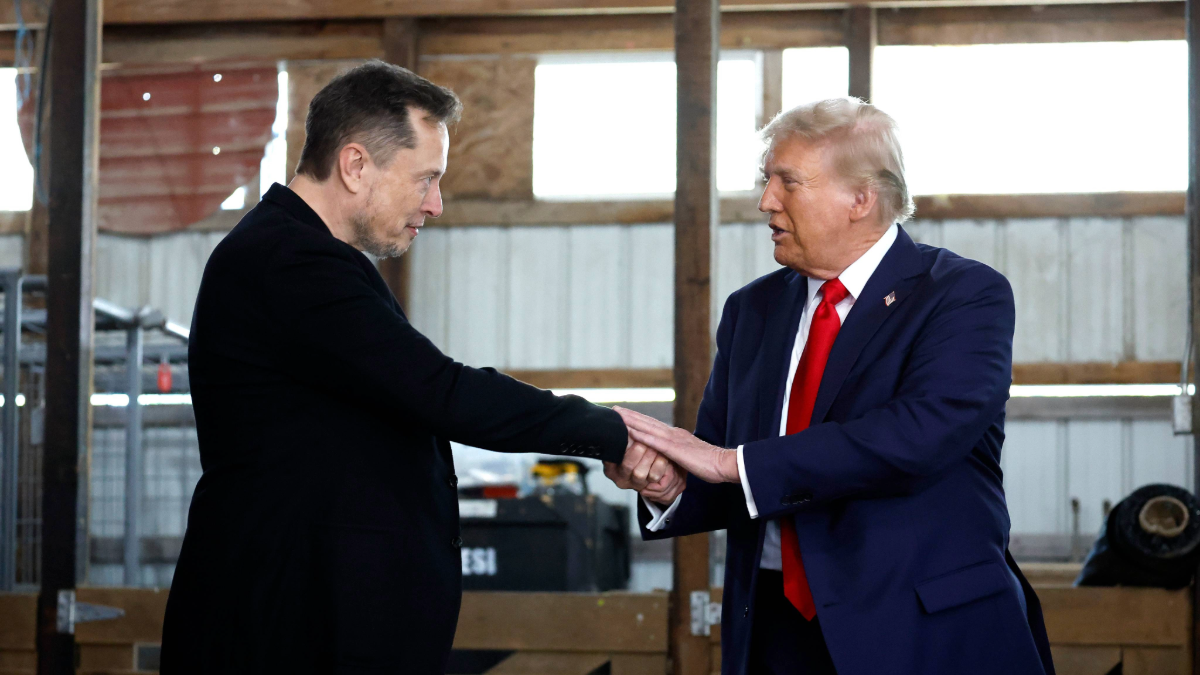How Elon Musk’s Influence Could Shift US AI Regulation Under the Trump Administration
Haileleol Tibebu / Nov 14, 2024
BUTLER, PENNSYLVANIA - OCTOBER 5, 2024: Elon Musk (L) shakes hands with then-Republican presidential nominee now President-elect Donald Trump backstage during a campaign rally at the Butler Farm Show grounds. (Photo by Anna Moneymaker/Getty Images)
With President-elect Donald Trump’s 2024 election win and Elon Musk now positioned within Trump’s inner circle, the landscape of AI regulation in the United States faces a notable shift and increased complexity. The incoming Trump administration’s stated preference for fewer regulations contrasts with the Biden administration’s framework of initiatives, which emphasized rigorous standards for AI safety, transparency, and accountability. Musk’s influence introduces a unique and complex dynamic: a strong advocate for technological acceleration, he has also warned of the existential risks posed by unchecked AI.
This partnership raises several critical questions: To what extent will Musk's guidance on AI shape policy change? What direction is Musk likely to advocate for—will his influence lead to policy cuts, or will safety and ethical standards hold priority? And ultimately, how might Musk's own stakes in AI innovation affect the administration’s regulatory stance? As the US prepares for the transition of power, its new approach to AI regulation may profoundly shape both domestic AI advancements and global governance efforts, setting a defining precedent in the field.
The Regulatory Landscape Under the Biden Administration
Under President Biden, the US developed several regulatory initiatives to address the need to regulate artificial intelligence. This included the Blueprint for an AI Bill of Rights, which aimed to protect civil liberties through principles addressing privacy, fairness, and user rights; the October 2023 Executive Order on Safe, Secure, and Trustworthy AI, which required extensive safety assessments, data transparency, and accountability measures to reduce risks such as algorithmic bias and security vulnerabilities; and the October 2024 National Security Memorandum, which set ethical standards for AI used in national security.
The Biden administration also required the appointment of Chief AI Officers across federal agencies to ensure adherence to ethical standards and consistent oversight of AI implementation. The administration supported the National Institute of Standards and Technology (NIST) in its partnership with the Department of Commerce to advance its existing AI Risk Management Framework. These initiatives are now subject to potential changes under the Trump administration.
The Trump Administration’s Deregulatory Approach and Musk’s Role
With President-elect Trump’s return to office, a shift in AI regulatory priorities is anticipated, leaning toward fewer restrictions and a focus on economic growth. Trump’s first term championed deregulation as a catalyst for innovation across industries, reducing regulatory barriers in sectors like telecommunications and financial services to enhance the US economy’s competitive edge. In the tech sector, this translated to minimal government intervention, encouraging private companies to self-regulate on matters such as data privacy and cybersecurity.
However, Elon Musk’s presence as a prominent advisor adds a layer of complexity to this trajectory. Musk, a tech titan with a stake in advancing cutting-edge technologies, is presently engaged in various regulatory battles with federal agencies and has just been appointed by President-elect Trump to run an initiative to radically reduce the size of the administrative state. Yet Musk has also voiced serious concerns about AI’s long-term societal impacts, particularly around artificial general intelligence (AGI), which he describes as posing “existential risks.” In early 2023, he co-signed an open letter urging a six-month pause on AGI research to allow time for careful consideration of its ethical implications. And this year, he backed a controversial California bill to regulate AI.
This dual stance—advocating both for regulatory freedom to accelerate technology and for caution in specific high-risk areas—adds an unpredictable dynamic to President-elect Trump’s deregulation agenda, raising questions about how AI policy may ultimately take shape under this administration. If Musk manages to persuade Trump to advance safety standards driven more by existential concerns than present-day problems, there’s a risk that immediate social protections could be overlooked in favor of industry growth, allowing AI applications to advance without adequate safeguards for current societal impacts.
Certain sectors are likely to be particularly shaped by Musk’s influence on AI policy, potentially reflecting a selective regulatory approach that aligns with his complex stance on innovation versus oversight. This selective approach could indeed catalyze rapid advancements in sectors where the US seeks to maintain or build global dominance, like AI-driven manufacturing, robotics, or logistics automation, by lowering regulatory barriers and compliance costs. However, the strategy also risks creating ethical and accountability gaps in domains where minimal oversight could lead to significant societal impacts.
Global AI Governance and the Impact of the Trump-Musk Partnership
While the Trump administration focuses on domestic AI regulation, the question of how the US engages with global AI governance initiatives remains critical. Under President Biden, the US positioned itself as a leader in setting ethical AI standards on the global stage, partnering with international organizations like the United Nations. This included active contributions to the UN’s Global Digital Compact, which was endorsed by member states at the UN's "Summit of the Future" in September 2024. President-elect Trump’s historical skepticism toward multilateral organizations such as the UN suggests a potential shift in the US role within global AI governance frameworks. If the Trump administration steps back from these global efforts, other major players—such as China—could take the lead in shaping international AI standards, potentially resulting in a fragmented global regulatory landscape. If Musk can leverage his influence to guide the US toward selective engagement in global AI governance, his impact could extend beyond national policy, shaping international norms for AI safety and ethics.
The ultimate direction of US AI policy under President-elect Trump, influenced by Musk’s complex stance on regulation, remains uncertain but will undoubtedly shape AI governance on both national and global levels. Whether the administration leans toward accelerated innovation with selective safeguards or pursues a broader regulatory approach, the impact will ripple through international efforts to establish cohesive AI standards. This could set a long-lasting precedent that could redefine the landscape of AI ethics, accountability, and global cooperation.
Related Reading:
Authors
